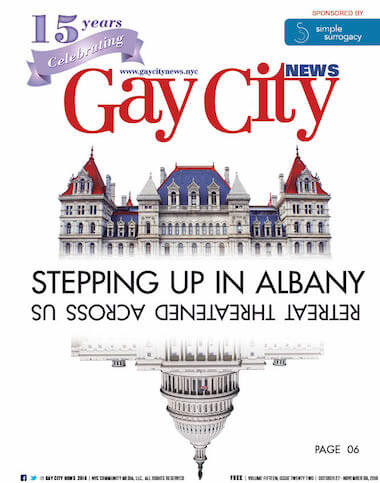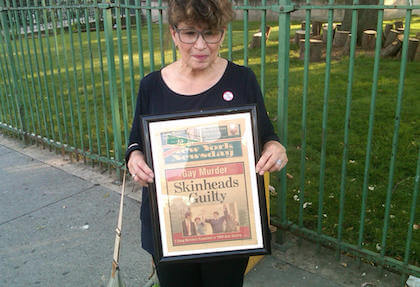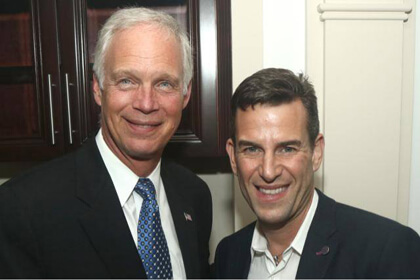Mara Keisling, executive director of the National Center for Transgender Equality. | NATIONAL CENTER FOR TRANSGENDER EQUALITY
BY DUNCAN OSBORNE | While not walking back comments she made in a Buzzfeed article about controversial LGBT rights legislation in Pennsylvania, the head of the National Center for Transgender Equality (NCTE) is revising and extending her remarks after the article sparked criticism and heated comments on social media.
The story concerned a measure that would have added sexual orientation and gender identity to a 1955 state law that barred other kinds of discrimination and included a number of protected classes, but not LGBT people. In June, the legislation, which barred only housing and employment discrimination, and not discrimination in public accommodations, passed a State Senate committee, but ultimately failed.
In recent years, right-wing small business owners have asserted that their religious practice is harmed when they have to serve LGBT people, particularly gay and lesbian couples seeking to marry. Right-wing groups have said that allowing transgender people to use bathrooms, locker rooms, and other public accommodations that are consistent with their gender is a threat to others using those facilities.
Excluding public accommodations is seen by some as a way to enact some protections for LGBT people while not engaging on these more contentious issues.
NCTE, along with the Log Cabin Republicans, Equality Pennsylvania, the American Unity Fund, Freedom for All Americans, the Transgender People of Color Coalition, and Gill Action, an affiliate of the Gill Foundation, a major funder of LGBT causes, supported the legislation. Leading national groups, notably the American Civil Liberties Union, opposed the compromise of excluding public accommodations from the Pennsylvania law.
Buzzfeed cast the Pennsylvania debate in broader terms.
The article referred to an August 1 conference call among “two dozen of the country’s top LGBT activists” during which they sought to resolve a disagreement over whether anti-discrimination legislation that excludes public accommodations is acceptable, with some arguing that it “could emerge as a model for other swing states where they’ve hit barricades.” Ohio, Florida, and Arizona were three states that could employ such a compromise, the article said.
“We have explicitly said over and over again that this is not a model for other states,” Mara Keisling, NCTE’s executive director, told Gay City News after the Buzzfeed story was published on October 25. “Our position here at NCTE is, of course, we should try to get everything, but we have to be practical.”
Debate within the LGBT community has sometimes dogged efforts to enact federal and state anti-discrimination laws.
The LGBT community’s original legislative goal, first introduced in Congress in 1974, was to add sexual orientation to the Civil Rights Act of 1964. That legislation was replaced by the Employment Non-Discrimination Act (ENDA), which only barred employment discrimination, in 1994. It generated controversy in 2007 when protections for transgender people were removed before a successful vote in the House. The protections were put back in the legislation in later versions.
Beginning in 2014, Queer Nation, the activist group, targeted Congressional Democrats and leading LGBT groups, the Human Rights Campaign (HRC) in particular, in a grassroots campaign that sought to replace ENDA with legislation that added sexual orientation and gender identity to the Civil Rights Act of 1964. ENDA was abandoned in the current Congress and the Equality Act, which amends the 1964 law, was introduced. This reporter was a central player in that campaign, and a core component was opposition to ENDA’s sweeping religious exemption.
COVER DESIGN BY MICHAEL SHIREY
In 2015, Equality Utah and HRC joined with the Mormon Church to enact an anti-discrimination law in Utah that barred employment and housing discrimination based on sexual orientation and gender identity. Public accommodations were excluded, and the law added new exemptions that effectively protected all entities, for-profit and non-profit, owned by the Church. Controversy over the law erupted after Queer Nation issued a press release pointing out that Robin Fretwell Wilson, a conservative law professor from the University of Illinois and longtime ally of leading anti-LGBT groups and people, played a major role in drafting the legislation.
While Wilson is not known to have been involved in drafting the Pennsylvania legislation, she did support the proposed law in an opinion piece published on pennlive.com last year.
The “Utah compromise,” as it came to be known, was presented as a model for other states, though mostly by right wingers. Chad Griffin, HRC’s president, first said of the Utah law, “The desire exhibited by the Mormon Church to work toward common ground should serve as a model for other faith traditions here in the United States.”
Other HRC staffers later backed off that assertion in public appearances, saying that the strategy of exempting public accommodations only applied in Utah. Senior staff at Lambda Legal and the National Center for Lesbian Rights (NCLR) also approved of the “Utah compromise,” but only in Utah.
“Generally, NCTE is on the side [Buzzfeed] said we weren’t on,” Keisling said. “People are upset because they are afraid people are throwing them under the bus.”
In the meantime, the fallout from the Buzzfeed piece is harsh.
“It’s ridiculous, it’s absurd,” Allen Roskoff, president of the Jim Owles Liberal Democratic Club and a longtime activist who once belonged to the early post-Stonewall Gay Activists Alliance, said of compromises that were part of the Pennsylvania legislation. “It’s a kind of contempt for full equality that some people have and accepting less than equal is an insult to the struggle.”
Roskoff was a co-author of a New York City law that added sexual orientation to the city’s anti-discrimination law. The law took 16 years to enact in part because activists would not agree to exemptions, such as excluding the police and fire departments from the law.
“If we wanted to take those kinds of compromises, we could have had the gay rights bill through the City Council years earlier, Roskoff said. “It’s an insult to everything our movement stands for.”





































